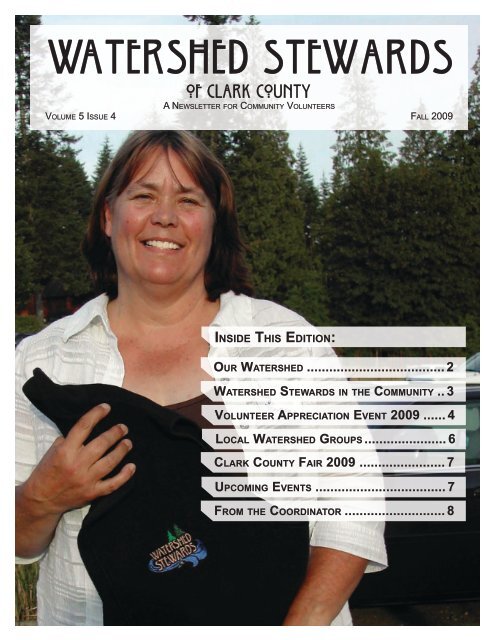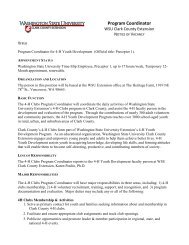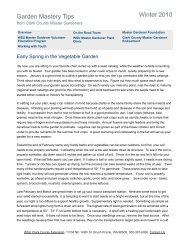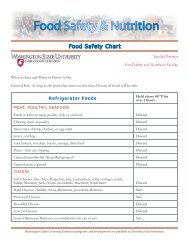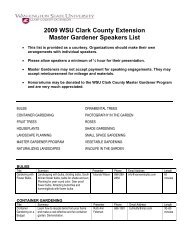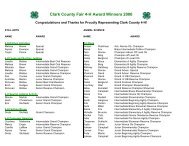Watershed Stewards - WSU Clark County Extension
Watershed Stewards - WSU Clark County Extension
Watershed Stewards - WSU Clark County Extension
You also want an ePaper? Increase the reach of your titles
YUMPU automatically turns print PDFs into web optimized ePapers that Google loves.
<strong>Watershed</strong> <strong>Stewards</strong><br />
Vo l u m e 5 Is s u e 4<br />
of <strong>Clark</strong> <strong>County</strong><br />
A Ne w s l e t t e r f o r Co m m u n i t y Vo l u n t e e r s<br />
Fa l l 2009<br />
Ins i d e Th i s Edition:<br />
Our Wat e r s h e d...................................... 2<br />
Wat e r s h e d St e wa r d s in th e Co m m u n i t y... 3<br />
Vol u n t e e r Ap p r e c i at i o n Ev e n t 2009....... 4<br />
Loc a l Wat e r s h e d Gr o u p s....................... 6<br />
Cla r k Co u n t y Fa i r 2009 ....................... 7<br />
Upc o m i n g Ev e n t s.................................... 7<br />
Fro m th e Co o r d i n at o r............................ 8
Our Wat e r s h e d<br />
High Water Temperatures and Low Flows in the East Fork Lewis River<br />
By Jenifer Naas and Doug Stienbarger<br />
The East Fork of the Lewis River is an amazing local resource,<br />
home to Chum, Coho, and Fall Chinook salmon as well as Sea-run<br />
Cutthroat, Summer Steelhead, and Winter Steelhead. All of these fish<br />
need clean, clear, and cold water to survive and spawn. Monitoring<br />
conducted by the Department of Ecology during 2005 indicated high<br />
summer water temperatures and low flows can significantly affect fish<br />
in the East Fork.<br />
This summer, Richard Dyrland, retired supervisory hydrologist, and<br />
an EPA trained volunteer with Friends of the East Fork<br />
(FOEF), conducted additional testing by placing remote<br />
FOEF temperature data,<br />
electronic temperature recorders, known as HOBOs**<br />
courtesy of Richard Dyrland.<br />
(see picture), in a three mile section of the East Fork<br />
below Daybreak Park. FOEF placed a network of these<br />
small devices which recorded hourly temperatures in the river<br />
from mid-June through mid-October. Data was compiled and analyzed this summer.<br />
The Department of Ecology sets temperature guidelines for the East Fork Lewis River at 16-18 degrees<br />
Celsius (60.8 to 64.4 degrees Fahrenheit). Ecology guidelines use a 7-day average of maximum temperatures<br />
instead of the daily temperatures, which tends to flatten out specific daily readings. FOEF hourly data showed<br />
water temperatures reached a fish stress level of 74 degrees and peaked at over 80 degrees for four days in one<br />
eleven day range, a situation exacerbated by daytime air temperatures in the 90s and 100s. During the same<br />
period, one side ground water fed side channel was eight degrees cooler. While not directly comparable to the<br />
state guidelines, the daily FOEF data supports earlier findings and suggests a continuing temperature problem.<br />
Water temperatures this high can harm or kill salmon, steelhead, and some aquatic food if they are exposed for<br />
too long. For short periods, fish can survive by using<br />
thermal refugia, such as pools, springs, etc.<br />
Stream flows vary by season, depending on storm<br />
events, snowmelt, and rainfall. Stream flow is<br />
measured in cubic feet per second (cfs): the higher<br />
the CFS, the higher the stream flow. The United<br />
States Geological Survey measures river flow at a site<br />
east of Daybreak Park (http://waterdata.usgs.gov/wa/<br />
nwis/dv?referred_module=sw&site_no=14222500).<br />
The Department of Ecology gives a range of 240-420<br />
cfs for optimal juvenile salmon survival.<br />
Data collected since 1929 show average flows of<br />
143 cfs in July, 83 cfs in August, and 110 cfs in<br />
September. The average for the last ten years is<br />
slightly lower at 118 cfs in July, 83 cfs in August, and<br />
88 cfs in September. The USGS recorded low flows (see graph) in the 40-50 cfs range for late August and<br />
much of September. Record low flows for the East Fork have been recorded in the 30s cfs range.<br />
CFS (mean)<br />
High stream temperatures and low flows can combine to produce harmful conditions for many species using<br />
the river. The East Fork, once known for its premier fishing, boasted a state record 32 lb. 12 oz. steelhead<br />
caught in 1980 (http://www.wogameandfish.com/fishing/salmon-steelhead-fishing/wo_aa025504a/). If high<br />
river temperatures and low flows continue, the East Fork will face serious challenges in the future.<br />
2<br />
140<br />
130<br />
120<br />
110<br />
100<br />
90<br />
80<br />
70<br />
60<br />
50<br />
40<br />
30<br />
20<br />
10<br />
0<br />
7/20/2009<br />
7/25/2009<br />
USGS Provisional East Fork Lewis Stream Flow Data<br />
7/30/2009<br />
8/4/2009<br />
8/9/2009<br />
8/14/2009<br />
8/19/2009<br />
8/24/2009<br />
8/29/2009<br />
9/3/2009<br />
9/8/2009<br />
9/13/2009<br />
9/18/2009<br />
9/23/2009<br />
9/28/2009<br />
Continued on page 3.
c o n t i n u e d fr o m pa g e 2<br />
To find out what you can do to help the East Fork of the Lewis River, contact the <strong>Watershed</strong> <strong>Stewards</strong> at<br />
http://clark.wsu.edu/volunteer/ws/ or Friends of the East Fork at http://www.eastforklewisriver.org/. More<br />
information on temperature monitoring can be found through the Washington State Department of Ecology’s<br />
website: http://www.ecy.wa.gov/programs/wq/tmdl/EForkLewis/technical.html.<br />
** Older HOBO versions using clear plastic (as seen in the photo) can be susceptible to sunlight, and depending on placement, can<br />
overstate temperatures by a few degrees F. Newer HOBO versions are placed in pvc tubing to prevent sunlight heating, so data from<br />
different studies may vary slightly depending on the instrument used.<br />
Wat e r s h e d St e wa r d s in th e Co m m u n i t y<br />
Cindy Morgan, <strong>Watershed</strong> Steward’s<br />
Outstanding Volunteer<br />
By Leslea Steffel-Dennis<br />
On a beautiful summer’s eve, in a lovely winery<br />
setting, <strong>Watershed</strong> <strong>Stewards</strong>, friends, and families<br />
gathered to enjoy beverages, a light meal and to<br />
acknowledge <strong>Stewards</strong> who make a difference in our<br />
community through their volunteerism.<br />
The recipient with the highest number of volunteer<br />
hours (500) was Cindy Morgan. I was acquainted with<br />
Cindy, but really didn’t know how dedicated, diverse,<br />
and passionate she is about what matters to her and<br />
how we all benefit from her tireless effort. I learned<br />
that Cindy is a researcher and a student. “Can’t”<br />
is not in her vocabulary. She became a member of<br />
<strong>Watershed</strong> <strong>Stewards</strong> during the second class held in<br />
2000. The knowledge and skill she learned during<br />
<strong>Watershed</strong> Steward training dovetailed into her<br />
involvement with Fish First and Friends of the East<br />
Fork, two organizations with which she still actively<br />
participates. Cindy is a <strong>WSU</strong> <strong>Extension</strong> Master<br />
Gardener.<br />
When asked where she devotes much of her time,<br />
Cindy mentioned:<br />
Serving as secretary of SW Washington<br />
chapter of Coastal Conservation Association<br />
(CCA) which includes creating and sending<br />
newsletters, assisting in the yearly fundraising<br />
banquet, organizing volunteers, and helping at<br />
the annual Klineline Kids Fishing Event.<br />
Serving as AG Chair (Horticulture Advisory<br />
Committee) at <strong>Clark</strong> College where she works<br />
to keep the program running for <strong>Clark</strong> College<br />
students.<br />
She served as a former board member Fish First.<br />
For all of her passions, when there is a cause she<br />
believes in, Cindy is there. She is known to legislators<br />
and government agencies and attends hearings locally<br />
and in Olympia to advocate for the issues she believes<br />
in connected to her work with other organizations.<br />
Cindy currently focuses on researching the damage<br />
done to the East Fork of the Lewis River through<br />
human activities in the hopes of drawing attention to<br />
the need to return the East Fork to its former status<br />
as one of Washington’s pristine rivers and a place<br />
where wild and endangered fish can return, spawn,<br />
and flourish. Growing up along the river’s edge<br />
provides Cindy first-hand knowledge of the river’s<br />
decline. It’s her river and she’s hard at work trying to<br />
bring it back. We can be sure she will log many more<br />
volunteer hours in her endeavor to preserve <strong>Clark</strong><br />
<strong>County</strong>’s river resources.<br />
Caption: Program Coordinator Jen Naas<br />
presents Cindy a vest during the recent Volunteer<br />
Appreciation Event in recognition of her 500<br />
lifetime hours for the <strong>Watershed</strong> <strong>Stewards</strong>.<br />
3
Vol u n t e e r Ap p r e c i at i o n Ev e n t 2009<br />
2009 Volunteer Appreciation Event<br />
On July 17th, more than 75 <strong>Watershed</strong> <strong>Stewards</strong> and guests came to the Rusty Grape Vineyard in Battle Ground,<br />
WA to celebrate each other in service to <strong>Clark</strong> <strong>County</strong>’s environment. The event was sponsored by the <strong>Clark</strong><br />
<strong>County</strong> Clean Water Program and <strong>WSU</strong> <strong>Clark</strong> <strong>County</strong> <strong>Extension</strong>. We thank all of the volunteers for making<br />
<strong>Watershed</strong> <strong>Stewards</strong> and family enjoy the shade during the<br />
Volunteer Appreciation Event.<br />
the program successful and making a<br />
positive change in our watersheds.<br />
<strong>Watershed</strong> Steward Young Leung with Vicki Duval<br />
Newly graduated volunteers Jill Cox<br />
and Joanne Kessler<br />
Since the first training in 2000, 258<br />
volunteer graduates of the <strong>Watershed</strong><br />
Steward training have collectively<br />
volunteered almost 20,000 hours to<br />
a variety of outreach, restoration and<br />
educational events.<br />
<strong>Watershed</strong> Steward Mindy Brooks with family.<br />
This year, we honored 32 <strong>Watershed</strong> <strong>Stewards</strong><br />
and 19 Volunteer Monitors who, together, have<br />
contributed more than 1,700 hours in 2008. These<br />
honorees have donated a more than 6,700 hours<br />
since their training.<br />
<strong>Watershed</strong> Steward Bill Ward and wife Flo enjoy the shade and<br />
food during the event.<br />
Volunteer monitors assist county staff in<br />
monitoring water quality at key sites on local<br />
streams. In 2008, 28 volunteers participated in<br />
49 monitoring opportunities and contributed 315<br />
volunteer hours.<br />
4
<strong>Watershed</strong> Steward<br />
Jeff Duval<br />
<strong>Watershed</strong> Steward George Pollock receives his award from<br />
<strong>County</strong> Commissioner Steve Stewart.<br />
<strong>Clark</strong> <strong>County</strong> Clean Water Program and <strong>WSU</strong> <strong>Extension</strong> recognizes the following <strong>Watershed</strong> Steward<br />
volunteers:<br />
500+ Lifetime Hours<br />
Cindy Morgan<br />
300+ Lifetime Hours<br />
Monty Multanen<br />
David Olesen<br />
100+ Lifetime Hours<br />
Julie Singmaster<br />
Wes Sumrill<br />
Janet Swihart<br />
45+ Hours in 2008<br />
Jac Arnal<br />
Judy Bufford<br />
Ben Dennis<br />
Doug Malone<br />
Cindy Morgan<br />
David Olesen<br />
Randall Pearl<br />
David Page<br />
George Pollock<br />
Monty Multanen<br />
Terry Schulz<br />
Tara Smith<br />
Janet Swihart<br />
Completed 40+ Hours since Training<br />
Lisa Beranek<br />
Mindy Brooks<br />
Denielle Cowley<br />
Francis Foley<br />
Walt Griffith<br />
Geri Kromminga<br />
Linnea LaRocque<br />
Lois Lee<br />
Kim Morris<br />
Kari Mullikin<br />
Sonya Norton<br />
Eldon Schmidt<br />
Dan Swink<br />
Corinne Thompson<br />
Marilyn Tyrrell<br />
The <strong>Clark</strong> <strong>County</strong> Water Quality Monitoring Program recognizes the following individuals:<br />
Gee Creek Focused Assessment Lake Monitoring Macroinvertebrate Sampling<br />
Tim Dean Ed Kraft Graeme Friedrich<br />
Carol Moffet Eldon Schmidt Cameron Thompson<br />
Dennis Yarosz<br />
Phil Trask<br />
Salmon Creek Focused Assessment<br />
Tim Dean Sherry Farabee Ed Kraft<br />
Linnea LaRocque Kimberly Morris Bill Owen<br />
Carleen Pagni George Pollock Tara Smith<br />
Daniel Swink<br />
Glen Tribe<br />
5
Oth e r Wat e r s h e d Gr o u p s<br />
Coastal Conservation Association<br />
Nello Picinich<br />
The Coastal Conservation Association (CCA) is the largest marine conservation organization in the country,<br />
with a presence in 17 states. Along with their recent expansion into the Pacific Northwest, comes an impressive<br />
“conservation first” track record along the Gulf and Atlantic coasts.<br />
Consider for a moment the following assessment of our fisheries: “It does not require a study of the statistics<br />
to convince one that the salmon industry has suffered a great decline during the past decade…(we) have drawn<br />
wealth from her streams, but now, by reason of our wastefulness and lack of intelligent provision for the future,<br />
the source of that wealth is disappearing and is threatened with annihilation...”<br />
That statement appeared in a report of the Oregon Fish and Game Protector. The year was 1894.<br />
That same statement could have easily been written today. Many wild salmon runs in Washington, California,<br />
and Oregon are listed as threatened and endangered under the Endangered Species Act and the collapse of the<br />
Pacific salmon fishery has caught national attention. We are in the midst of a crisis, one that has been building<br />
for more than a century.<br />
One preventable problem is derelict gillnets. Derelict gill nets, or ghost nets (commonly used for commercial<br />
fishing) are abandoned or lost by fisherman and catch fish, marine birds, and mammals as they float in the<br />
ocean without owners. Derelict gillnets result in needless damage to marine resources and habitat. While the<br />
Columbia River has its share of abandoned or derelict gillnets, the problem is especially evident in the Puget<br />
Sound. CCA Washington recently supported the Northwest Straits Commission in obtaining a $4.5 million<br />
federal grant to remove thousands of derelict gill nets<br />
from Puget Sound.<br />
CCA has grown faster in the Pacific Northwest than<br />
in any part of the country or at any time in the history<br />
of the organization because people are motivated<br />
to save these fish. With almost 10,000 members<br />
throughout the Pacific Northwest, Washington is<br />
already the fourth largest state chapter in the nation.<br />
For more information, visit www.ccapnw.org.<br />
6
Cla r k Co u n t y Fa i r 2009<br />
A River Flows Through It<br />
by Doug Stienbargar<br />
In a different twist for the annual <strong>Clark</strong><br />
<strong>County</strong> Fair, the <strong>Watershed</strong> <strong>Stewards</strong><br />
joined other environmentally themed<br />
programs from the county at the Fair this<br />
year. Tying everything together, a painted<br />
river flowed through the booth areas,<br />
drawing lots of people and compliments.<br />
Thanks to Kathleen McKellar who<br />
donated plants and designed the rain<br />
garden, to Sonya Norton who did an<br />
amazing job on the backdrop, and<br />
to Dave Shehorn, Jeff Duval, Sue<br />
“River” flowing around<br />
central kiosk.<br />
<strong>Watershed</strong> Steward’s Booth.<br />
Pickering, Wes Sumrill and many<br />
others who designed and setup our<br />
display this year. Everyone got into<br />
the picture and Commissioner Marc<br />
Boldt even helped build the central<br />
kiosk. The <strong>Watershed</strong> <strong>Stewards</strong><br />
booth included public favorites,<br />
Steward’s booth in action.<br />
such as a rain barrel, a rain garden,<br />
and Canines for Clean Water.<br />
<strong>Stewards</strong> staffed an amazing 64 shifts and talked to more than 2,000<br />
people about keeping water clean! Kudos to everyone on a great job!<br />
Upc o m i n g Ev e n t s<br />
Bring on the Rain!<br />
Fall/Winter Workshops by <strong>Clark</strong> <strong>County</strong> <strong>Watershed</strong> <strong>Stewards</strong><br />
Rain Barrel Workshop: Build a rain barrel to use<br />
at home. $35 for rain barrel - one per household<br />
Monday, November 2 - 6:30-8:30 p.m.<br />
CASEE - Rm 202/205<br />
11104 NE 149th, Brush Prairie<br />
Green Homes: Learn to save energy, manage the<br />
rain, improve your home, and save money. FREE!<br />
Saturday, October 17 - 9:00 a.m.-2:00 p.m.<br />
<strong>WSU</strong> Research Station/ 78th Street Farm<br />
1919 NE 78th Street, Vancouver<br />
7<br />
Green Auto Care: Reduce your car’s impact on the<br />
environment and learn about environmentally friendly<br />
car maintenance. FREE!<br />
Thursday, October 29 - 6:30-8:30 p.m.<br />
EcoAuto - 210 W. McLoughlin Blvd, Vancouver<br />
Green Cleaning Workshop: Make a green holiday<br />
gift! FREE. (Optional kit for pre-purchase $15)<br />
Thursday, December 10 - 6:30-8:30 p.m.<br />
Three Creeks Library<br />
800-C NE Tenney Road, Vancouver<br />
Register now, classes fill up quickly!<br />
Call 360-397-6060 x 0 to register or for more information
Fro m th e Co o r d i n at o r<br />
As fall begins here in Southwest Washington, the <strong>Watershed</strong> <strong>Stewards</strong> program begins a new round of volunteer<br />
training with 19 trainees from a variety of backgrounds, ages, and interests. I look forward to learning more<br />
about participants. Fall also brings workshops, including two new topics (see Page 7 for details). I am excited<br />
to expand our offerings and hope you will come and learn more about protecting our watershed.<br />
I want to thank the many volunteers who worked at this year’s <strong>Clark</strong> <strong>County</strong> Fair; 42 volunteers covered 66<br />
shifts at the fair. These wonderful volunteers made contact with 2,052 adults and children, an increase over last<br />
year! I wanted to send a special thank you to the many volunteers who designed, built, and then dismantled the<br />
display after Fair! Thanks to Dave Shehorn, Kathleen McKellar, Sue Pickering, Sonya Norton, Jeff Duval, Wes<br />
Sumril, Young Leung, and Tracy Sand. You all made a big difference!<br />
Upcoming Events:<br />
<strong>Watershed</strong> <strong>Stewards</strong> Training - Wednesday evenings September 9 through November 11. <strong>WSU</strong> Research<br />
Station.<br />
<strong>Watershed</strong> <strong>Stewards</strong> green home auditing workshop – October 17, 9am-2pm. <strong>WSU</strong> Research Station<br />
<strong>Clark</strong> College Make a Difference Day – October 22nd<br />
<strong>Watershed</strong> <strong>Stewards</strong> field trip with LCFEG – October 24, 9am-2pm<br />
<strong>Watershed</strong> <strong>Stewards</strong> green auto care workshop - October 29, 6:30-8:30pm, EcoAuto<br />
<strong>Watershed</strong> <strong>Stewards</strong> rain barrel construction workshop – November 2nd, 6:30-8:30 p.m., CASEE<br />
Third Saturday at Steigerwald Refuge with the <strong>Watershed</strong> <strong>Stewards</strong> – November 21st 9-12:30<br />
<strong>Watershed</strong> <strong>Stewards</strong> green cleaning workshop – December 10, 6:30-8:30, Three Creeks Library.<br />
<strong>Watershed</strong> <strong>Stewards</strong> Program<br />
Jenifer Naas<br />
Program Coordinator<br />
360-397-6060 x 7703<br />
Jenifer.Naas@<strong>Clark</strong>.wa.gov<br />
http://clark.wsu.edu/volunteer/ws/<br />
The <strong>Watershed</strong> <strong>Stewards</strong> Program is<br />
jointly funded and sponsored by <strong>WSU</strong><br />
<strong>Clark</strong> <strong>County</strong> <strong>Extension</strong> and the <strong>Clark</strong><br />
<strong>County</strong> Clean Water Program and is<br />
paid for through <strong>Clark</strong> <strong>County</strong> Clean<br />
Water Fees.<br />
<strong>WSU</strong> <strong>Extension</strong> Programs and policies are consistent with federal<br />
and state laws and regulations on nondiscrimination regarding<br />
race, sex, religion, age, color, creed, national or ethnic origin,<br />
physical mental or sensory disability, marital status, sexual<br />
orientation, status as a Vietnam-era or disabled veteran. Evidence of<br />
noncompliance may be reported through your local <strong>Extension</strong> office.<br />
The views expressed in this newsletter reflect those of the<br />
author(s) and not necessarily those of the sponsoring institutions.<br />
Clean Water Program<br />
www.clark.wa.gov/water-resources<br />
http://clark.wsu.edu


